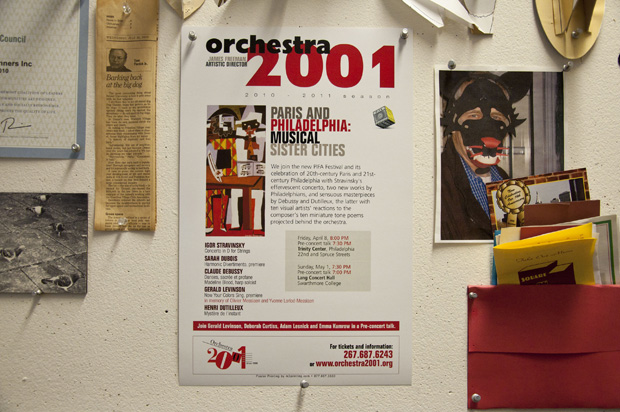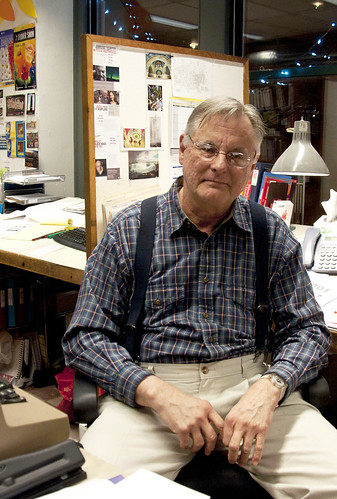
The Knight Foundation offers grants to improve arts in the city.
The Knight Arts Foundation has selected its 55 finalists for this year’s Knight Arts Challenge, which reviewed more than 1,200 ideas from art producers across the city.
The challenge, which originated in Miami two years ago, is in its second year in Philadelphia.
Funding the Arts
Last year, the Foundation awarded 36 grants, totaling approximately $2.7 million, to local artists who had come up with the most artistic ideas. Most ideas focused on expanding a certain artistic genre throughout the city, like music or visual art.
One of the recipients was Temple Baptist Church, who was awarded $20,000 in grant money from the John S. and James L. Knight Foundation.
“Grants are not easy to come by, especially for the smaller art groups,” Knight Foundation program director Donna Frisby-Greenwood said.
Frisby-Greenwood said that usually the larger, more exposed art groups have the available resources and time to approach the foundation in search of grant money, leaving thousands of new, innovative ideas unexplored.
“It would take forever for a single person to come across 1,200 ideas just by themselves. That’s why we want to get people to share ideas with us,” Frisby-Greenwood said. “We want to see who’s out there with great ideas so we can fund them.”
Since October 2011, more than 1,000 local artists and art groups submitted their ideas, in the form of a 150 word essay, to the Foundation with hopes of receiving both grant money and the all important exposure that comes with being selected in the contest.
Out of these applicants, 55 finalists remain as they wait for their full proposals to be reviewed and judged for the April 23 final announcement.
“We make it easy,” Frisby-Greenwood said. “Usually [artists] have to go through a much longer process – a letter of intent, hope that someone actually reads their letter, write a full proposal and go through a three to six month reviewing process, with no guarantee of even getting the grant.”

Frisby-Greenwood said the advantage of this contest is that smaller groups don’t have to spend nearly as much time and money with the application process, making their stab at the contest practically risk free. And when it comes to what exactly the foundation is looking for when it wants to fund a particular idea or project, Frisby-Greenwood said the criteria is quite simple.
“The first question we ask is: Is it art? And then: Is it good art?” Frisby-Greenwood said.
“We get a lot of applicants who submit ideas and say they’re going to institute an art program, but it’s not really ‘art.’ They’re just trying to get some extra money, and we only have so many projects we can fund.”
Although the number of applications dropped from 1,700 to around 1,200 last year, which mimics a similar trend in the Miami contest after its first year, Frisby-Greenwood said that the quality of the ideas have not fallen off, and the contest has attracted many submissions by more individual artists and art collectives.
Meet the Finalists
One finalist comes from the Hacktory, which aims to expand the usage of electronic and digital art throughout the city.
“It’s an artist residency program,” said Georgia Guthrie, the director of the Hacktory. “We select a few artists who want to work in digital and electronic medium. They come to the Hacktory and do workshops in programming, software and circuits, and we let them use our workspace. In the end, we let them do projects and we have them teach classes for after school programs.”
Guthrie’s reserved optimism for the project speaks to the difficulties of not being one of the larger art attractions in the city.
“It’s just an idea,” Guthrie said. “We came up for a concept for the proposal. We really like it, and we’ve continued to fundraise, but we’re not really going all out for fundraising until we find out whether we get the grant or not.”
Guthrie also explained that although the Hacktory is not yet a household name in Philadelphia, the company has ties in the city that make its proposed project all the more viable.
“We’ve worked with Fleisher Art memorial, and from that experience we’ve seen that there’s a demand for people to not only learn about electronic and digital arts, but also to see and experience for themselves what this technology can offer,” Guthrie said.
And what the Hacktory can offer to the city, too.
Guthrie believes that her project can be a real attribute for the city, pressing for education in the math and sciences while providing opportunities for local artists looking for a way to get their foot in the door.
Making Moves and Music
Bill Gatti, administrative director of Center City’s Orchestra 2001, believes his company can be just as influential, but with music rather than technology.
Orchestra 2001, which has been in Philadelphia since the early 1980s, is joining forces with local and world-renowned musicians to produce new music celebrating the life of Martin Luther King, Jr. The project will incorporate efforts from “Play On, Philly,” a West Philadelphia student vocal ensemble, the Gospel Choir of the African Episcopal Church of St. Thomas, composers Richard Danielpour and Jay Fluellen and clarinetist Anthony McGill, principal clarinet of the Metropolitan Opera Orchestra.
“It’s really a celebration of cultural diversity, bringing concerts to as many people and venues, as we can, to promote music to people who maybe have never even heard or listened to this genre before,” Gatti said.
Throughout the project’s two-year lifespan, all of these musicians will perform their own tribute to the life of King, including Richard Danielpour’s world premiere of a new concerto for clarinet and orchestra at the Kimmel Center in 2014, and Pulitzer Prize-winning composer Joseph Schwantner’s “New Morning for the World: Daybreak of Freedom” for narrator and chamber orchestra, which is planned to be one of the project’s opening acts.
“We want to expose art to people who aren’t engaged in the local art scene,” Frisby-Greenwood said. “But also, we want to create new art, something Philadelphia has never seen before.”
Khoury Johnson can be reached at khoury.johnson@temple.edu.



Be the first to comment